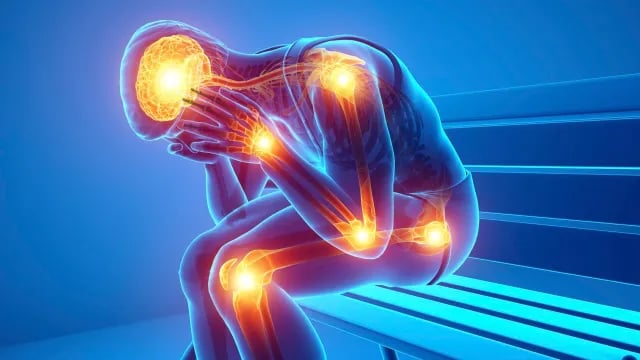🔥 Inflammation: Friend or Foe? The Double-Edged Sword of a Vital Reaction 🔥
Discover the ambivalent role of inflammation: a protective shield and a potential danger to your health. Learn to decode its signals and preserve your well-being.
HEALTHBLOG-LIST
11/3/20243 min read


Inflammation... this word often evokes pain, redness, and swelling. We fight it with anti-inflammatory drugs, considering it an enemy to be defeated. But did you know that this often-maligned reaction is actually essential to our survival? Like a double-edged sword, inflammation is a vital process that protects us but can also turn against us.
In this article, we will explore the two sides of this complex reaction: its beneficial role in defending the body and the dangers of chronic inflammation. Ready to unlock the mysteries of inflammation and take care of your health? Let's go!
Table of Contents
Inflammation: an essential defense mechanism
The cardinal signs of inflammation
When inflammation becomes chronic: the dangers
How to soothe inflammation naturally?
FAQ
Conclusion
In a nutshell
Inflammation is a natural response of the body to protect itself from aggression.
It is manifested by characteristic signs: redness, heat, pain, swelling.
Acute inflammation is beneficial, but chronic inflammation can be harmful.
Adopting a healthy lifestyle helps prevent chronic inflammation.
1. Inflammation: an essential defense mechanism
Imagine your body as a fortress besieged by invaders: bacteria, viruses, injuries... Faced with these aggressions, it deploys an army of cells and molecules to defend the territory. This is inflammation!
This complex process allows to:
Neutralize pathogens: immune cells eliminate microbes and cellular debris.
Repair damaged tissues: inflammation promotes healing and regeneration.
Limit the spread of infection: the affected area is isolated to prevent the infection from spreading.
2. The cardinal signs of inflammation
How to recognize inflammation? Four characteristic signs betray it:
Redness: due to the influx of blood into the affected area.
Heat: increased local temperature.
Pain: caused by the pressure of swollen tissues and the release of chemical substances.
Swelling: accumulation of fluid and immune cells in the tissues.
3. When inflammation becomes chronic: the dangers
While acute inflammation is a beneficial reaction, chronic inflammation is insidious. It settles permanently in the body, like a smoldering fire, and can contribute to the development of many diseases:
Cardiovascular diseases: chronic inflammation of the arteries promotes atherosclerosis.
Type 2 diabetes: inflammation disrupts blood sugar regulation.
Neurodegenerative diseases: Alzheimer's, Parkinson's... inflammation plays a role in the degeneration of neurons.
Cancers: chronic inflammation can promote tumor growth.
The causes of chronic inflammation are multiple:
Poor diet: excess sugar, saturated fat, processed foods.
Sedentary lifestyle: lack of physical activity promotes inflammation.
Chronic stress: stress keeps the body in a state of alert and stimulates inflammation.
Smoking: tobacco is a powerful pro-inflammatory.
Pollution: exposure to air pollutants aggravates inflammation.
Certain diseases: autoimmune diseases, chronic infections...
4. How to soothe inflammation naturally?
Fortunately, solutions exist to prevent and relieve chronic inflammation. Here are some tips:
Adopt an anti-inflammatory diet: favor fruits and vegetables, fatty fish, spices such as turmeric, ginger...
Exercise regularly: moderate physical exercise has anti-inflammatory effects.
Manage your stress: yoga, meditation, relaxation... find techniques that help you let go.
Get enough sleep: sleep allows the body to regenerate and fight inflammation.
Avoid tobacco and limit your alcohol consumption.
Maintain a healthy weight.
5. FAQ
Q: Is inflammation always bad?
A: No, acute inflammation is a normal and beneficial reaction that allows the body to defend itself. It is chronic inflammation that is harmful to health.
Q: What foods should be avoided in case of inflammation?
A: It is advisable to limit processed foods, refined sugars, saturated fats and refined vegetable oils (sunflower, corn...).
Q: How do I know if I have chronic inflammation?
A: Certain signs may alert: persistent fatigue, joint pain, digestive problems, skin problems... If in doubt, consult a health professional.
Conclusion
Inflammation is a fascinating and complex process, both protective and potentially destructive. By understanding how it works and adopting a healthy lifestyle, you can master this double-edged sword and preserve your health capital. Do not hesitate to consult a health professional for personalized advice.
